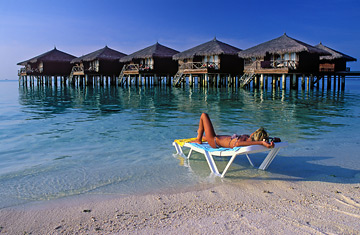
A tourist in the Maldives.
I spent my summer vacation in the Maldives. I snorkeled, I snoozed. I caught up on back issues of the New Yorker. I got to know the local marine life, from the baby sharks and rays that swam up to my villa to a black-and-yellow fish charmingly named the Oriental Sweetlips. But I did not learn a single thing about the Maldives, because I never ventured beyond the grounds of my hotel.
This is what I knew before I landed in the capital Male: the Maldives comprises a string of atolls somewhere west of Sri Lanka, and because of rising ocean levels resulting from global warming, the entire country could eventually disappear. Hence, the impulse to visit sooner rather than later.
As a journalist, I have a bad habit of asking questions even when I'm supposed to be relaxing. On vacation in Ethiopia, my husband (also a journalist) and I peppered our guide with queries about relations between ethnic groups. (Not so good.) In Belize, we wanted to know the origins of the Amish people who sold watermelon by the side of the road. (They came from Pennsylvania, via Mexico.) In Bhutan we wondered whether or not people really loved their king as much as is officially claimed. (The answer seemed to be yes, although the feelings among the minority of Nepalese origin were less clear.)
The Maldives was the first trip where I found out absolutely nothing — not even the thumbnail version of the history and culture typically offered by a guidebook, because I had neglected to buy one. I suspect, though, that my choice to remain ignorant of the country around the resort in which I was sunning myself is hardly uncommon among vacationers. Westerners often visit Burma or Laos and never quite realize that these countries are so wonderfully pristine and offer tourists a relaxed sense of security because they're run by ruthless regimes. Others groove to reggae in the resort nightclubs of Jamaica but avoid venturing into the grim realities of Trenchtown and other impoverished neighborhoods that produced the likes of Bob Marley. Once, I scorned such lack of curiosity; now, I was no different.
In this age of near-instant gratification in which it takes less than a day spent sitting in a metal tube to travel from the skyscrapers of New York to the temples of Laos, it has become easier to travel the world without really seeing any place at all. Hotels don't help. I've stayed in a Balinese-style villa in Central America, as well as a North African-themed room in Southeast Asia. And the whole idea of a branded hotel or resort chain is usually to make the visitor comfortable by offering a sameness verging on monotony. Even menus rarely provide more than a clue or two as to your location — perhaps a local breed of fish cooked in the same overused Thai curry, or a regional herb tucked into a roast.
To assuage my guilt, after returning home, I Googled the Maldives. This is what I found out: It is both the tiniest country in Asia in terms of population (300,000) and the world's smallest Muslim majority nation. A coup in 1988 was followed by a brief Indian military intervention called, for reasons still not clear to me, Operation Cactus. Administrative power is largely held by Atoll chiefs. The Maldives is the flattest country on Earth.
On my last day in the Maldives, I had briefly considered quizzing the waiter who brought my herb-scented scrambled eggs on what he thought about global warming. But the potential disappearance of an entire nation seemed a holiday buzz-kill. So I refrained from asking any questions. Maybe next vacation.
